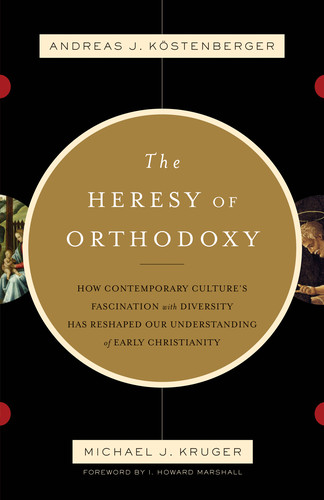On “The Heresy of Orthodoxy”, Part One
 This is the first in a series of posts on Andreas J. Köstenberger's and Michael J. Kruger’s recent book, The Heresy of Orthodoxy: How Contemporary Culture’s Fascination with Diversity has Reshaped our Understanding of Early Christianity (Wheaton, ILL: Crossway, 2010). It is one of a number of books written in reaction to works by scholars (particularly Bart Ehrman) associated with the “Bauer school”—i.e., influenced by Walter Bauer’s landmark book Orthodoxy and Heresy in Earliest Christianity (Rechtgläubigkeit und Ketzerei im ältesten Christentum, originally published in 1934). I suppose that I, too, would be considered a member of this “school”; so, I am very interested in critiques of Bauer’s work and those who have followed in his footsteps. Also, I have written previously, both here and in print, on examples of what I have called anti-Christian Apocrypha apologetic. And K&K’s book certainly falls into that category.
This is the first in a series of posts on Andreas J. Köstenberger's and Michael J. Kruger’s recent book, The Heresy of Orthodoxy: How Contemporary Culture’s Fascination with Diversity has Reshaped our Understanding of Early Christianity (Wheaton, ILL: Crossway, 2010). It is one of a number of books written in reaction to works by scholars (particularly Bart Ehrman) associated with the “Bauer school”—i.e., influenced by Walter Bauer’s landmark book Orthodoxy and Heresy in Earliest Christianity (Rechtgläubigkeit und Ketzerei im ältesten Christentum, originally published in 1934). I suppose that I, too, would be considered a member of this “school”; so, I am very interested in critiques of Bauer’s work and those who have followed in his footsteps. Also, I have written previously, both here and in print, on examples of what I have called anti-Christian Apocrypha apologetic. And K&K’s book certainly falls into that category.
First, a basic description of the book. Like previous works of this kind, it is published by a press known for fairly conservative (or simply theological) books: Crossway. The testimonials filling the opening pages are all by conservative writers, several of whom have written books very much like this one (e.g., Darrell Bock, Dan Wallace). The forward by Howard I. Marshall seems to anticipate any criticisms of the authors’ theological perspective: “The authors write as adherents of what would probably be identified as an evangelical Christianity that maintains a belief in the divine inspiration of Scripture, but, so far as I can see, their arguments are not dependent on this belief and rest on solid evidence and reasonable arguments” (12). He couldn’t be more wrong.
K&K describe the purposes behind their work in language of alarm. They are concerned that the modern attraction to diversity is interfering with the determination of what is truth. On the title of the book they say, “It is an epithet that aptly captures the prevailing spirit of the age whose tentacles are currently engulfing the Christian faith in a deadly embrace, aiming to subvert the movement at its very core” (16). After describing the viewpoint of the Bauer school (called here the “diversity doctrine” but most often, “the Bauer-Ehrman thesis”), they add, “The main reason why we feel so strongly about this issue is that the scholarly squabbles about second-century geographical expressions of Christianity, the formation of the canon, and the preservation of the text of Scripture are part of a larger battle that is raging today over the nature and origins of Christianity. This battle, in turn, we are convinced, is driven by forces that seek to discredit the biblical message about Jesus, the Lord and Messiah and Son of God, and the absolute truth claims of Christianity. The stakes in this battle are high indeed” (18). These “forces” are more fully described at the very end of the book, where they are given supernatural form: “we must proceed prayerfully, recognizing that it is the god of this world who has blinded the minds of unbelievers. With God’s help, we should wage spiritual warfare circumspectly and seek to demolish demonic strongholds n the minds of people” (234).
The book is then divided into three parts: “The Heresy of Orthodoxy: Pluralism and the Origins of the New Testament,” “Picking the Books: Tracing the Development of the New Testament Canon,” and “Changing the Story: Manuscripts, Scribes, and textual Transmission.” For our purposes, the first two parts are most important as they discuss and dispute the Bauer thesis in great detail and devote considerable space to Bauer’s and Ehrman’s views on the CA.
[To be continued…]

At least credit must be given for the openness with which the authors ride forth to battle their supernatural opponent, a ‘god of this world’, with ‘tentacles’ and ‘deadly embrace’, lurking inside a ‘demonic stronghold’. Usually, I encounter the objections to the plurality hypothesis in the form of ‘real scholarship has already moved past that‘ and ‘the vast majority of scholars do not subscribe to that view’. I much prefer an honest statement of the real motives to a pseudo-scholarly claim that only aims to downplay my, hopefully, reasonably educated approval of plurality in EC.
Thanks for starting this series of reviews. Looking forward to hearing the rest of your thoughts. I did my own three-part review of this book on my blog awhile back: http://earliestchristianity.wordpress.com/category/the-heresy-of-orthodoxy/
Timo: I can’t be that charitable. First, K&K don’t explicitly state their aim, and Marshall says that their faith does not affect their scholarship. Second, are not such “honest statements” essentially saying, “I am a poor scholar (that is, I am a theologian and my arguments are guided by certain unscientific presuppositions) but it’s okay as long as I admit it”? That’s not good enough for me.
Tim: I began reading your own review last night. I guess I’m a little late with this. I’ll post a link to it on my next installment.
Sorry to hear that you identify your own religious position with education. Please be more tolerant.
Huh?